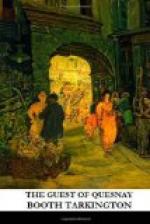“But what is she?” demanded Keredec impatiently; and it could be seen that he was striving to control a rising agitation. “Is she blonde? Is she brunette? Is she young? Is she old? Is she French, English, Spanish—”
“I think,” said Madame Brossard, “I think one would call her Spanish, but she is very fat, not young, and with a great deal too much rouge—”
She stopped with an audible intake of breath, staring at my friend’s white face. “Eh! it is bad news?” she cried. “And when one has been so ill—”
Keredec checked her with an imperious gesture. “Monsieur Saffren and I leave at once,” he said. “I shall meet him on the road; he will not return to the inn. We go to—to Trouville. See that no one knows that we have gone until to-morrow, if possible; I shall leave fees for the servants with you. Go now, prepare your bill, and bring it to me at once. I shall write you where to send our trunks. Quick! And you, my friend”—he turned to me as Madame Brossard, obviously distressed and frightened, but none the less intelligent for that, skurried away to do his bidding—“my friend, will you help us? For we need it!”
“Anything in the world!”
“Go to Pere Baudry’s; have him put the least tired of his three horses to his lightest cart and wait in the road beyond the cottage. Stand in the road yourself while that is being done. Oliver will come that way; detain him. I will join you there; I have only to see to my papers—at the most, twenty minutes. Go quickly, my friend!”
I strode to the door and out to the gallery. I was half-way down the steps before I saw that Oliver Saffren was already in the courtyard, coming toward me from the archway with a light and buoyant step.
He looked up, waving his hat to me, his face lighted with a happiness most remarkable, and brighter, even, than the strong, midsummer sunshine flaming over him. Dressed in white as he was, and with the air of victory he wore, he might have been, at that moment, a figure from some marble triumph; youthful, conquering—crowned with the laurel.
I had time only to glance at him, to “take” him, as it were, between two shutter-flicks of the instantaneous eyelid, and with him, the courtyard flooded with sunshine, the figure of Madame Brossard emerging from her little office, Amedee coming from the kitchen bearing a white-covered tray, and, entering from the road, upon the trail of Saffren but still in the shadow of the archway, the discordant fineries and hatchet-face of the ex-pedestrian and tourist, my antagonist of the forest.
I had opened my mouth to call a warning.
“Hurry” was the word I would have said, but it stopped at “hur—.” The second syllable was never uttered.
There came a violent outcry, raucous and shrill as the wail of a captured hen, and out of the passage across the courtyard floundered a woman, fantastically dressed in green and gold.




